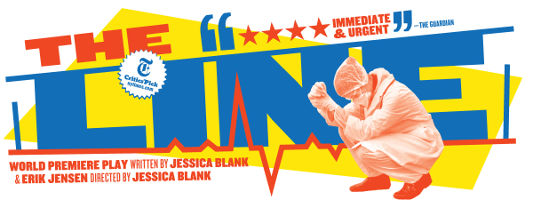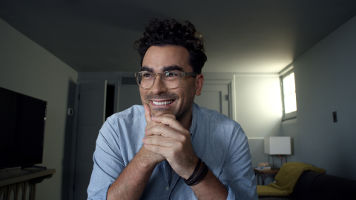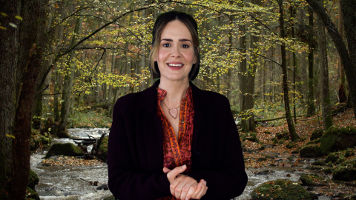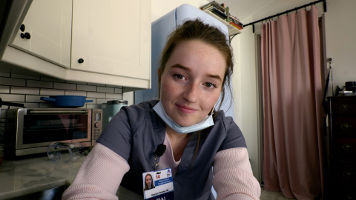
Edward
Rubin
HBO’s Coastal Elites: Ever since COVID-19 shut down our theatres, movie
houses, museums, concert halls, opera houses, jazz clubs, and
stadiums – in short, our country’s entire entertainment
industry – thus robbing thousands upon thousands of singers,
actors, writers, producers, directors, musicians, athletes and
countless others, of their livelihood, not to mention their raison
d’etre, there has been a marked increase in entertainment
offerings on TV, cable, online through blogs, websites and streaming
services like Netflix, Hulu and Disney. Some are free, some are
for pay, and all are being eagerly snapped up by pleasure seeking
audiences. A goodly number of these venues are asking for a donation for their own venue, as well as such organizations as the Actors Fund, The Brooklyn Hospital Center, and major unions Actors’ Equity Association, SAG-AFTRA. Obviously, people need to be entertained, performers need to perform, producers need to produce, and venues and creative workforces need to be supported. The most blatant change, brought about by COVID-19 is the need for people, in all walks of life and an army of bloggers, professional entertainers and artistic creators – be it in fact or fiction –-to talk about how the novel coronavirus is affecting their daily lives in everyday talk, in writings, paintings, dances and songs.
The most powerful “in your face” presentation that I saw this past summer was Jessica Blank’s and Erik Jensen’s film The Line, a documentary-style play offered online for a month of streamable performances by the Public Theatre. All six actors, mouthing the words taken from actual interviews of front line COVID-19 workers, take on the personas of real-life doctors, nurses, paramedics and other personnel in New York hospitals. Their stories are harrowing. The bravery of these workers, all who are putting their lives at risk, is inspirational. Echoing everybody’s experiences is Ed, an ex-Vietnam medic who sees the city of New York itself as a pandemic battlefield. Another pre-and post-COVID-19 slanted offering, muchly peppered with condemnation of Trump and the current administration, was presented one time only this past September. HBO’s Coastal Elites was originally written by playwright and novelist Paul Rudnick, intended to be performed at New York City’s Public Theater. Widely known for his humorous and satirical writings which regularly appear in the New Yorker, Rudnick turned to Matthew Jay Roach (Meet the Fockers, Trumbo, Bombshell) to direct, but the closing of all theatres in the city nixed that idea. Here we get 5 fictional monologues, each one running 15 to 20 minutes, all but one filmed in a single take. The actors, sitting in their own space - behind a desk, in a TV studio, or in their own apartment – all looking directly at the camera and delivering their story, each from a different perspective. One is seen talking to a policeman, another to his therapist, a third to her TV audience, and two, presumably to us. Each of five segments are titled, and dated as to the month in which they take place. Each monologue is introduced with chanting in the background and the familiar sound bites of Trump, Pence and Ivanka. Coastal Elites kicks off with the rolling of the film’s titles and various possible subtitles being flashed across the screen. First up is “five heart tugging monologues.” Quickly morphing into “five unhinged rants,” and “five desperate confessions,” it ends up reading: “five desperate confessions from people barely coping with the new abnormal,” a more appropriate title, given that the characters are frightened, confused, and infuriated by the current state of politics, culture, and the pandemic.
First to tell her January dated, before the quarantine, story titled Lock Her Up is Bette Midler, Coastal Elites’ major calling card. Her monologue, with a hefty serving of self-aware humor, compliments of Paul Rudnick, is frantically delivered in near-screaming decibels. Just before Midler don’s her role as Miriam Nessler, a left-leaning, Trump-hating New York City liberal Jewish retired school teacher, we hear crowds chanting in the background, “Lock Her Up, Lock Her Up, Lock Her Up.” As unlikely and fantastical as Miriam’s story is, it does cover, perhaps even sums up, from every conceivable angle, all of the worries and concerns of the general public, as well as those of the four story-telling monologists that follow. Miriam is telling her story to a seemingly sympathetic officer at the police station where she ended up after snatching a MAGA hat from total stranger in Starbucks. Yes, he did file a police report. Asking the officer, who we never see, in near-begging tones to “Please listen to me so you will understand, she begins to weave a tale that encompasses everything and the kitchen sink, including her current addiction to collecting tote bags. Most of Miriam’s anger, as in Midler’s real-life rants, is directed towards Trump. who she insists on referring to as “HE” or “HIM.” “I am a New Yorker and we always hated Trump. It’s not just the hair and the lying. HE has no style, no sense of humor. HE tore down Bonwit Teller’s in the middle of the night. HE wouldn’t rent to black people.” “Even during the Nixon and Roy Cohen days, I didn’t go to bed in a rage and panic attack. I didn’t spend the day in anger and dread, and I didn’t hate the other people, those people from Nebraska and Ohio and Alabama. We didn’t hate them. That’s what HE did. Maybe we weren’t buddies but we didn’t despise them. That’s what HE did.” Concluding her explosive rant, an unbowed and refortified Miriam informs the officer and audience alike that “We are fighting that guy, fighting all the bastards. We want our country back and we are going to March and sign petitions and register people to vote.” As for the MAGA hat incident, unwavering in her intentions, she unabashedly declares that she would do it again.
The beginning of segment two is dated March and titled “Super Gay.” Even before Dan Levy (“Schitt’s Creek”) an out gay actor, takes stage, we hear Vice President Pence, in a snippet taken from a speech he is giving talking about marriage: “…that institution that forms the background of our society’s traditional marriage. It is lost on nobody that Pence, a rabid, long-time
antigay crusader who co-sponsored a proposed amendment to the
U.S. Constitution (2004) that would define marriage as solely
between one man and one woman, is implying that marriage between
man and man, and woman with woman is unnatural. “It isn’t
our idea. It is God’s idea” he states. It is a chance of a lifetime and he is worrying as to how he should play it. Should he show his gay face or should he play it straight. All of which leads him to thinking about his gay identity and the various compromises he is and isn’t willing to make.
The Blond Cloud, segment three, takes place during
the month of June. While echoes of Black Life Matters protests against police brutality is going on outside Callie’s window, “The Blond Cloud,” as Callie refers to Ivanka, is an evisceration of Ivanka who not so surprisingly turns out to be every bit as politically minded as her father. Obviously, it runs in the family.
Seizing the moment, Ivanka, who has not seen Callie in years, plays the old friend game, ushering her up to the Lincoln Bedroom. Her stated intent is to enlist Callie’s help in rebranding her image among the African American community. Though this story is strictly fanciful, it is entirely plausible, which makes this gossipy tale all the more compelling.
Hands down, segment four “Because I Have To Tell Somebody,” starring Sarah Paulson, set in May, is the funniest (think “Saturday Night Live”) of all of the Rudnick penned monologues. In the second half, it does an about turn and shows us what a dyed-in-the-wool Trump-loving family living in the heartland might looks like. Sweeping past a clatter of voices yelling “Four more years of Trump”, Paulson playing Clarissa, a seemingly spaced out, new age guru with her own cable TV show (or is it on YouTube?) is seen giving one of her mediation sessions. Her stone-faced delivery, backed by calming music and bucolic images of trees, valleys, lakes, and fields of wheat and flowers, leads to Coastal Elites’ funniest string of words. “I know you’re scared” Clarissa begins. “Enlightened words will sooth you or at least allow you to watch CNN without screaming at your partner. I’d like you to close your eyes and envision a hillside lush with wildflowers and overlooking a peaceable and undisturbing valley. You’re like Julie Andrews singing the Sound of Music with her arms opened wide and never dreaming that she would be trafficked by the Catholic Church in becoming an unpaid nanny under a Nazi regime and ultimately marring an employer twice her age, a scenario that can be rightly termed Edelweiss Me2 hashtag none of my favorite things and soon gone trap.” Visibly breaking down, Clarissa, interrupting her own show leaves the set, only returning to tell the story of her recent visit to her family, all of who are wearing MAGA hats when she arrives. Worse, any anti Trump mentions are dismissed as Fake News by her mother. The only saving grace, after she flees the family home in disgust, is when her father shocking confesses at the airport, just as she is about to board her plane back to Vermont, that it was Trump’s trashing of John McCain, a secret he tells Clarissa to keep from the family, that will be costing the president his vote. “President Miriam USA,” the last and most emotionally moving monologue, far less driven by the personal ego-driven concerns of the four preceding monologists, takes place at the height of the coronavirus during the month of April. Here we that meet Sharynn, a young volunteer nurse who comes to New York City from Wyoming to work at Mount Sinai hospital. Like all the other monologues, this one is preceded by a string of outrageous claims, in this case from Trump, who is heard telling his listeners that he is a stable genius, and that he alone is going to make America great again. Referring to the virus which he contends will soon disappear, he tells us that “Fauchi has been wrong, and that the first thing we have to do, presumably Trump’s his idea of a cure, “is to hit the body with a powerful light.” Of course, what Sharynn finds Mount Sinai hospital speaks otherwise. It is “surreal.” People are dying in droves. The halls are filled with the sick, waiting for an available room. Refrigerated trucks to hold the dead are parked outside the hospital, and four nurses have come down with the virus. “We’re all just trying to hold it together, she Sharynn says “cause that is what were taught at nursing school. Do the job, and provide comfort. “
The story, beautifully told by Kaitlyn Dever, begins after one of Sharynn’s grueling 14-hour shifts at the hospital. Still wearing her hospital scrubs, her RN photo ID, and her face mask dangling from her right ear, she sits down at her kitchen table. It is obvious that she is tired, overwhelmed, and has a deeply felt need to tell us her story, the gist of which centers around Miriam an elderly female patient she befriends. A tough dyed-in-the-wool Democrat with plenty of wise and sassy sayings, Miriam quickly becomes Sharynn’s touchstone, “the only thing, that is keeping her going.” As fate would have it, after a touch and go recovery, just as Miriam is deemed well enough to be discharged from the hospital, she is felled by a stroke. Devastated that she was not with Miriam during her last minutes, Sharynn is heartbroken. It is a sad, take no prisoners, ending. However, as Sharynn tells us earlier, “If you start crying, you’ll never stop.” |
| recordings | coupons | publications | classified |






